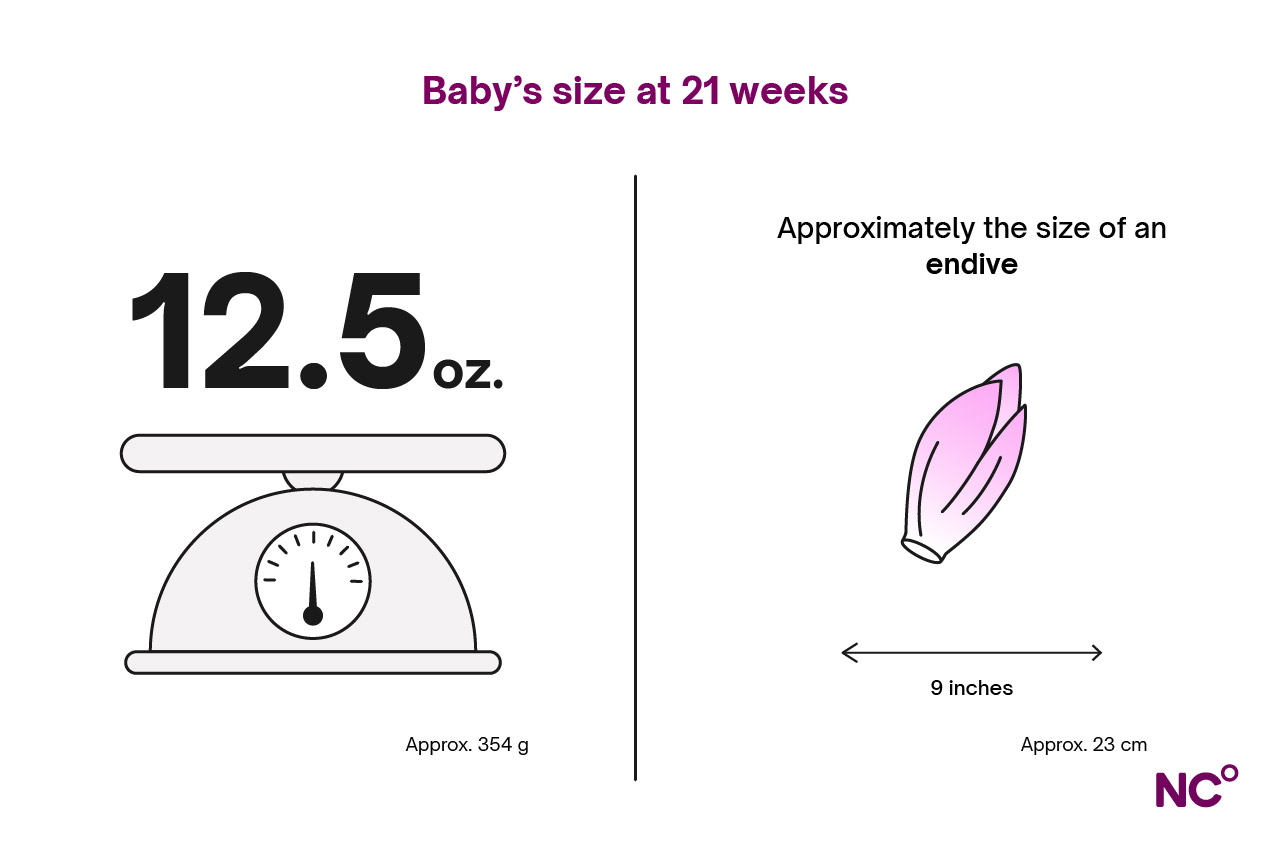21 Weeks pregnant: Symptoms, baby development and tips
Follows NC° Editorial Policy
At Natural Cycles, our mission is to empower you with the knowledge you need to take charge of your health. At Cycle Matters, we create fact-checked, expert-written content that tackles these topics in a compassionate and accessible way. Read more...
Key takeaways:
- If your sense of balance feels off, it’s not your imagination – your growing uterus is actually changing your center of gravity
- Your growing baby now weighs more than the placenta
- Hormonal and physical changes during pregnancy can increase your likelihood of getting a urinary tract or certain vaginal infections, particularly in the second trimester
Congratulations – you are now past the halfway point of your pregnancy! You are also about halfway through your second trimester. In this week’s article, we’ll talk about how your center of gravity is changing and explain why it’s normal to continue to feel tired in the second trimester. We’ll also check in on your baby and offer some guidance on what to look out for if you are experiencing symptoms that might indicate a urinary tract or vaginal infection. Finally, we will offer some tips on things you can do this week to support your body in pregnancy week 21.
Your body at week 21
Clumsiness
Have you noticed your balance is not as steady as it once was? Your growing belly actually affects your center of gravity, making you more unsteady on your feet. Whether you are riding public transportation, practicing yoga, or trying to do everyday tasks like getting something from a high shelf or walking a dog who pulls on the lead, you might discover maintaining your balance is difficult. As your baby grows, this will continue and can even get worse.
Be careful to avoid any situations that risk falling, like using a step stool or wearing high heels. If you live in a cold environment, or if winter is approaching, be especially careful walking on icy or slippery services. Consider investing in winter boots with spikes, or purchasing ice cleats to attach to your shoes.
If you ride public transport, make use of specially marked seats intended for those who are pregnant, older, or who need extra assistance. If you are not yet showing, or nervous about taking these spaces, consider using a “baby on board” badge to communicate to other passengers that you need to sit down during your journey. These badges are often available for free from various transportation providers in the UK, Ireland, and Germany.
Tiredness
While some experience a boost of energy in the second trimester, it’s also normal to continue to feel tired. Growing a baby is hard work! Prioritizing your sleep, resting when possible, and being mindful of your changing energy levels can help you manage fatigue during this time. It’s also important to minimize stress both in your personal and working environments by keeping aware of situations that can contribute to stress or anxiety, and practicing relaxation techniques like deep breathing, meditation, or prenatal yoga whenever possible.
Enjoying a healthy diet and pregnancy-safe exercise are two tools that can boost your energy levels and help fight fatigue. In particular, it's important to make sure you are consuming enough iron. When you are pregnant, your body requires extra iron in order to make more blood to carry oxygen to both you and your baby. One side effect of iron deficiency is fatigue, and adding more iron to your diet can help. Animal-based proteins, beans and peas, and fortified cereals are all good sources of iron. Make sure to talk to your doctor or midwife before starting any new supplements. Exercise, if safe to do so in your pregnancy, can also boost energy levels and might even help you sleep better at night.
Your baby’s development at 21 weeks
Your baby is busy moving around in the uterus, sucking its thumb, and swallowing. At 12 to 12.7 ounces (340 to 360 grams), they now likely weigh more than the placenta [1]. Your baby is also now measured from crown to heel, rather than crown to the end of their bottom. This week, they are around 8.5 to 10.6 inches (21.6 to 27 centimeters), which is about the size of an endive (also called chicory). Your baby’s hearing is also developing, and some studies have suggested that babies in week 21 will even begin responding to your voice, especially when you speak out loud and rub your stomach at the same time [2].

Pregnancy symptoms in week 21
Round ligament pains
If you have been experiencing aching or sharp pains on either side of your stomach, these might be round ligament pains. The round ligaments are located on both sides of your uterus and connect your uterus to your pelvis. The pregnancy hormone relaxin softens your muscles and encourages them to stretch to support your growing baby and uterus. As these muscles expand vertically on each side of your abdomen, the stretching can cause pain on the sides of your stomach and even into your hips and pelvis. Pain can be particularly acute when you make sudden movements and cause the muscles to contract, like when you sneeze, cough, roll over in bed, stand up quickly, or laugh [3].
This pain does not cause any harm to you, or your baby, but it can be both shocking and uncomfortable. Changing positions to alleviate discomfort, rest, and gentle stretching can all help with round ligament pain. It is also recommended that you avoid sudden movements that could cause the muscles to contract quickly, and to bend and flex your hips before coughing, sneezing and laughing.
If pain persists after resting, or if it becomes severe, notify your healthcare provider. It's important to share any pains or discomforts you are feeling with your care team so they can monitor your pregnancy and give advice on pain relief and prevention.
Urine and vaginal infections
Due to hormonal and physical changes in your body during pregnancy, there can be an increased risk of urinary tract (UTI) and certain vaginal infections during pregnancy.
Urinary tract infections during pregnancy are common because as your baby grows, the weight and pressure of the uterus can block parts of the urinary tract increasing the likelihood of infection. Symptoms of a UTI include [4]:
- Pain or burning when peeing
- feeling the need to pee even when your bladder is empty, or near empty
- pee that looks cloudy
- Blood in your pee
- Painful intercourse
- Lower abdominal pain, or pain under the ribs
- A high (fever) or very low temperature
If you suspect you have a UTI, contact your healthcare provider. UTIs are most commonly treated with certain antibiotics, which are safe for you and your baby. If left untreated, a UTI can lead to a kidney infection, which can be harmful for both of you. You can try and prevent a UTI by drinking plenty of water, drinking unsweetened cranberry juice regularly, trying not to hold your pee when you feel the need to urinate, urinating before and after sex, and keeping your genital area clean and dry.
Other vaginal infections more common during pregnancy include bacterial vaginosis (BV) and yeast infections. An estimated 10-30% of women experience BV during their pregnancy caused by changes in the bacterial environment of your vagina. A strong fishy odor, vaginal discharge that is grey in color, burning when peeing, itching and pain during sex are all symptoms of BV [5]. If you suspect you have BV, or are concerned about any changes in your vaginal discharge, contact your healthcare provider. You can help prevent BV by showering instead of bathing, keeping your vaginal area clean, and avoiding douching, which can remove good, healthy bacteria.
Yeast infections, including thrush, are most common during the second trimester of pregnancy and are linked to hormonal changes that cause an imbalance of acid and yeast in the vagina. While yeast infections are not known to cause any harm to the pregnancy or your baby, they can be more difficult to control during pregnancy and can be very uncomfortable [6]. The most common yeast infection symptoms include white discharge that resembles cottage cheese, redness, itching or irritation in the vagina, and a burning during urination or sex. It's important to talk to your healthcare provider if you suspect you have a yeast infection, since some medications commonly used to treat yeast infections are not recommended during pregnancy. Finally, you can try to prevent yeast infections by keeping the vagina cool, clean and dry and consuming foods that contain lactobacillus acidophilus like yogurt or kefir.
Tips in week 21
- Get your whooping cough vaccination: around week 20, you will likely be offered a whooping cough vaccine. Whooping cough can be very serious for babies, and getting vaccinated is the best way to protect your baby from developing whooping cough in infancy. It is generally recommended to get the whooping cough (also known as pertussis) vaccine before week 32 of your pregnancy.
- Eating for energy: as your body's working overtime to support you and grow your baby, it’s important that you try and provide it with as much energy as possible. A healthy diet that is rich in vitamins and minerals can ensure you are giving your body the fuel it needs.
- Try the pool: if you are looking to incorporate more physical activity into your routine, try swimming, water aerobics, or water walking. The buoyancy you get in a pool supports your weight, making water exercise a great option if you are experiencing limited mobility or other pregnancy-related discomforts. While swimming is considered one of the safest exercises to do while pregnant, it is important to discuss all exercises with your doctor to ensure they are considered safe for you during your pregnancy.
- Stretch out the hip flexor: whether you are suffering from hip or groin pain or not, your pelvis is under a lot of pressure as your baby continues to grow. You can help alleviate current discomfort, and prevent discomfort in the future, by stretching out your hip flexor. One common stretch is runners' lunge, which can be done with your knee elevated or touching the floor. If you have trouble reaching the floor with your arms or elbows, try using an exercise ball or chair for support.
Supporting your pregnancy with Natural Cycles
As the first FDA Cleared birth control app, Natural Cycles’ goal is to give you the tools you need to take care of your reproductive health. After conception, NC° Follow Pregnancy offers weekly guides on the changes going on in your body and your baby’s development alongside tools to track your pregnancy symptoms. Curious about using Natural Cycles during your pregnancy – why not check it out today?
Did you enjoy reading this article?
